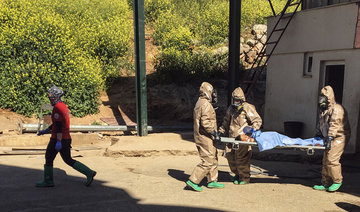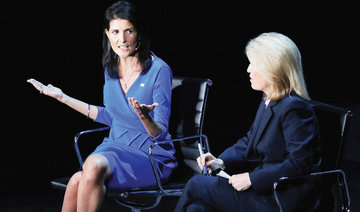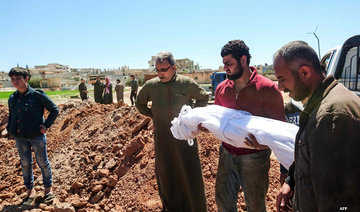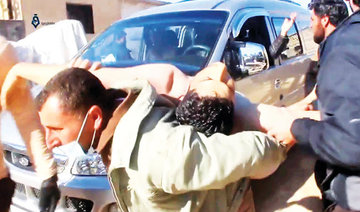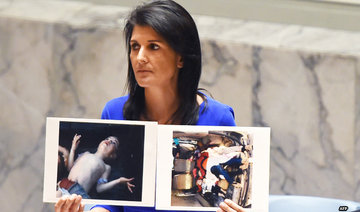DUBAI: The Syrian army said that seven people were killed and serious damage was caused by a US missile strike on an airbase in the centre of the country early on Friday.
"At 3:42 am (0042 GMT) the United States carried out a flagrant aggression with missiles against one of our airbases in the central region, killing six people and wounding a number of others, and causing significant damage," a spokesman said, reading from a statement on state television, without specifying whether the casualties were civilian or military.
On Thursday, US President Donald Trump ordered a massive military strike on a Syrian air base in retaliation for a “barbaric” chemical attack he blamed on President Bashar Assad.
In a brief televised address delivered hours after the UN Security Council failed to agree on a prove into the apparent chemical attack, Trump confirmed the US strike on Syria and urged “all civilized nations” to unite to end the bloodshed in the country.
“On Tuesday Syrian dictator Bashar Assad launched a horrible chemical weapons attack on innocent civilians using a deadly nerve agent,” Trump said. “Even beautiful babies were cruelly murdered in this very barbaric attack.”
“Tonight I ordered a targeted military strike on the airfield in Syria from where the chemical attack was launched. It is in this vital national security interest of the United States to prevent and deter the spread and use of deadly chemical weapons.”
“Tonight I call on all civilized nations to join us in seeking to end this slaughter and bloodshed in Syria and also to end terrorism of all kinds and all types,” Trump said.
The US military fired dozens of cruise missiles at the Shayrat Airfield at 8:45 p.m. Eastern Time (0000 GMT), officials said.
Some Russian officials believe that the US air strikes on a Syrian airbase could undermine efforts to fight terrorism, RIA news agency quoted Viktor Ozerov, the head of the defence and security committee at the Russian upper house of parliament, as saying on Friday.
He also said that Russia would call for an urgent meeting of the UN Security Council.
A White House official said 59 “precision munitions” had been blasted at the base, while a US defense official said “dozens” of Tomahawk cruise missiles were launched.
The missiles were fired from the USS Porter and the USS Ross, which belong to the US Navy’s Sixth Fleet and are located in the eastern Mediterranean. A US official said the missiles targeted aircraft and runways at the base.
The sudden US military action against the Assad regime marks a stunning development in Syria’s brutal, six-year conflict and a sudden about-face for Trump.
It came despite a warning from Russia of potential “negative consequences” if Washington strikes Syria.
“All responsibility if military action occurs will be on the shoulders of those who initiated such a doubtful tragic enterprise,” Russian Ambassador to the UN Vladimir Safronkov said.
A US official said Washington had informed Russia ahead of the Syria strike.
US Secretary of State Rex Tillerson had earlier vowed an “appropriate response” to the attack in Khan Sheikhun in rebel-held Idlib province, which killed at least 86 people, including 27 children.
The White House official said the United States assesses that the Assad regime used a chemical nerve agent consistent with sarin in Tuesday’s attacks.
WATCH: Punishing Assad: US fires cruise missiles at Syria air base
The fast-moving events come just days after the Trump administration had signaled it was no longer seeking the Syrian leader’s departure from power.
The attack on Khan Sheikhun appears to have marked a turning point for Trump and his administration.
On Wednesday Trump decried the attack as an “affront to humanity.” He seemed horrified by photographs showing dead children and victims suffering convulsions, breathing problems and foaming at the mouth.
“It crossed a lot of lines for me,” Trump said, alluding to Barack Obama’s failure to enforce his own “red line” on the use of chemical weapons in Syria four years ago.
In 2013, Trump had urged then-president Obama not to intervene against Assad.
In a startling about-turn, Tillerson called Thursday for “a political process that would lead to Assad leaving” and said his future role in the country was “uncertain.”
Syrian Foreign Minister Walid Muallem on Thursday repeated the regime’s denial it conducted a chemical strike.
“The Syrian army has not, did not and will not use this kind of weapons — not just against our own people, but even against the terrorists that attack our civilians with their mortar rounds,” he said.
Russia has stood by its longtime ally, with President Vladimir Putin warning against a rush to judgment.
Putin underlined “the unacceptability of making unfounded accusations against anyone before a thorough and impartial international investigation is carried out.”
The UN children’s agency UNICEF says at least 546 people were wounded in the suspected chemical attack.
More than 30 people were transferred across the border into Turkey for treatment, and Ankara said a preliminary probe found a link between these injuries and sarin.
(With Agencies)




